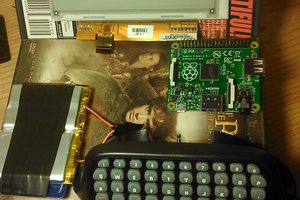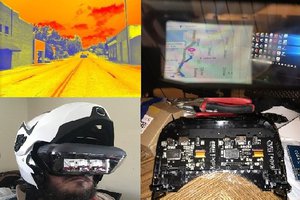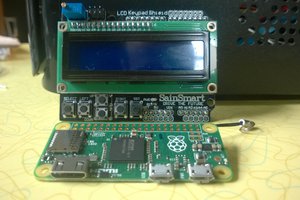More Information About Myself and the Project
I have a type of muscular dystrophy and my speech is getting hard to understand, which is very isolating. I've been working on various ideas the past few years, and this is one of them. While my initial motivation could be considered selfish because it's for my benefit, but I want to help others if I can.
The main options I've explored are eye tracking and switch scanning. Eye tracking is a good option, but it can be difficult to position correctly, and means the screen has to be right in front of them. I have another idea for eye tracking, but each solution has its pros and cons. Switch scanning trades the difficulty of positioning for reduced speed.
I think using a small head mounted display or smart glasses would make a switch scanning system less obtrusive, easier to set up, and more portable. I'm trying a head/glasses mounted display called Vufine+, which is just a screen with no other features. It's $200, which makes it a bit expensive, but compared to existing systems which can cost well over $5000, it's much more affordable.
Challenges and Initial Solutions
- The display is supposed to be equivalent to a 4 inch screen at 1 foot away. So showing the entire grid at the same time would be unusable. I have to write a program with an interface that's more appropriate for a miniature display. I have some experience with the Kivy GUI framework for Python. It's also cross platform, so I can do most of the development on my computer, which will make things easier.
- The screen has to be mounted correctly to see the entire screen. I have to figure out a system so a caregiver, who won't be looking at the screen, can position the screen properly.
- The computer has to be very small, have a portable power source, and be able to output to speech and/or a screen. And a secondary goal would be for it to type to a computer via Bluetooth. I will use a Raspberry Pi Zero W with a USB sound card and speakers. I will also have to find a small USB battery, and have a way to check the battery level so the user won't be stuck unable to communicate.
- It must support a wide range of switches, because different users have different body parts that are strong enough. Most accessible switches use a 3.5 mm audio jack connector, so I'll connect a jack to one of the GPIO pins on the Raspberry Pi.
- It must be self contained and reliable. That means I'll need to design a case to 3D print that will hold everything in place and make sure nothing gets disconnected. And if necessary I'll make a PCB for it.
Current Progress
- I have a Raspberry Pi Zero W, and so far I've installed the Raspbian OS and installed Kivy. I've also tested it with the Vufine and confirmed that it works. Also, I wired a switch jack to the Raspberry Pi and wrote a test program to see if the button presses are detected.
- I've written a very simple switch scanning program that responds to a keypress. It will still take a lot of work.
Thanks for looking, and please click "like" so I will potentially get money from Hackaday to support the costs!
 Philip Weiss
Philip Weiss
 j0z0r pwn4tr0n
j0z0r pwn4tr0n
 Josh Starnes
Josh Starnes

 PointyOintment
PointyOintment